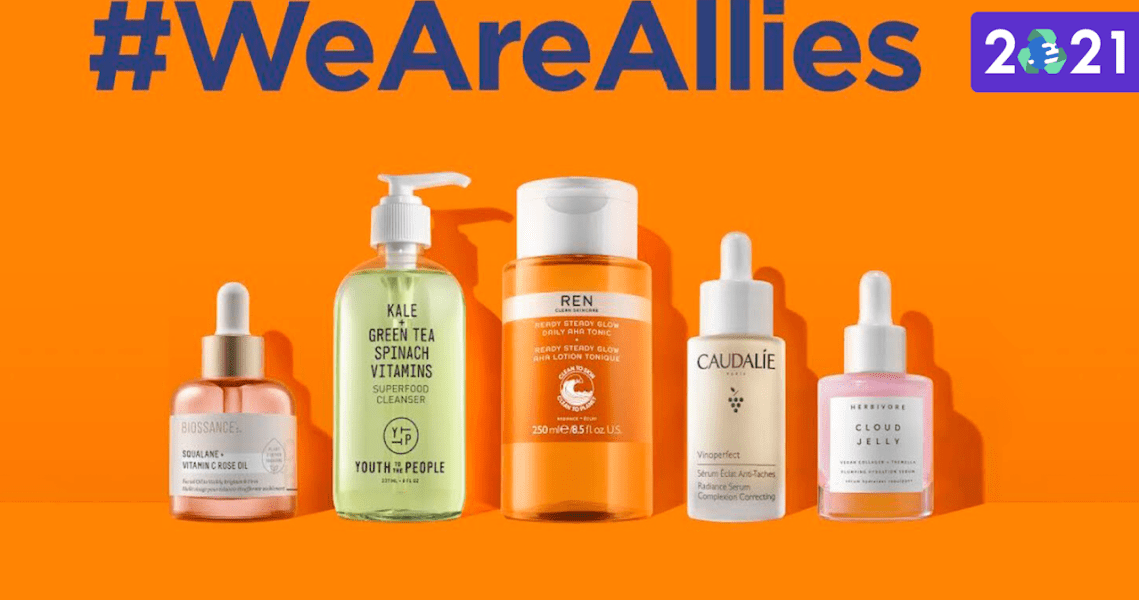Today’s story is part of Glossy’s Earth Week series, which spotlights sustainability efforts and topics across the beauty and fashion industries.
On Monday, five competing clean skin-care brands came together to make a zero-waste pledge, throwing their support behind the idea that partnerships are crucial to the development and execution of sustainability goals.
Led by REN, the consortium of brands includes Biossance, Caudalie, Herbivore and Youth To The People, which are all sold at Sephora. The zero-waste pledge states that all the brands will create packaging that can be recycled and reused and that contains recycled materials by 2025. REN made this same commitment in 2018 and will meet this goal in 2021. Its parent company Unilever also made a similar pledge in 2017. The purpose of the pledge is twofold: to advance sustainability and to show that collaboration is more fruitful than competition.
“We are fighting for market share with these people; we are all in the same clean beauty industry and have the same kind of products competing with each other. But [they] all said, ‘Yes, we’re competitors, but there’s something bigger [than us] and that is protecting the planet,’” said Arnaud Meysselle, REN CEO.
Meysselle said the pledge would have been announced in April 2020 but was postponed due to the pandemic. He added that he was hesitant about calling up others brands to join the pledge, given the industry’s perception that all brands are competitors and cannot work together.
The pledge extends to not only full-size products, but also travel and sample sizes and shipping materials. Executives have (virtually) met for brainstorming workshops on sachet sample alternatives, as both REN and Biossance have developed alternatives and the consortium will make a formal announcement in July on the sachet alternatives that all five brands are using. Industry data suggests that approximately 122 billion sample sachets are produced every year, and they’re impossible to recycle. U.K.-based environmental group A Plastic Planet called for sachets to be banned in an open letter in Feb. 2020. Companies and brands like Unilever, makeup brand Cover FX and skin-care brand Circumference are also developing alternatives to traditional physical sampling formats. The consortium will also tackle shipping box solutions, like the Boox reusable box, and will aim to make collateral materials like event pamphlets, marketing materials and in-store signs zero-waste as well.
Though the goal is set for the year 2025, most of the brands will achieve it or come close to completion before then. For example, Herbivore Botanicals already uses glass jars for its containers, so much of its zero-waste pursuit will focus on transitioning its plastic caps and droppers to recyclable post-consumer recycled plastic by 2023. Caps, pumps and droppers are another major issue for curbside recycling because they can be made from several different plastic types, and include metal springs or inside liners which prevent them from being processed at a recycling plant.
Ad position: web_incontent_pos1
“Until recently, there has not been a lot of improvement in [cap and pump innovation],” said Vicky Benincasa, Herbivore Botanicals senior director of product marketing. “It is exciting that alternatives are available and is accessible to a brand of our [smaller] size. The more brands that join this pledge, the more accessible options become.”
The brands have all planned to share their commitment publicly across their social media channels starting April 19. A Sephora spokesperson confirmed that the retailer will also support the pledge’s efforts by sharing it with the Sephora community on its social channels. However, Sephora does not have any other involvement and has not announced any goals or achievements surrounding sustainability since 2019.
“In this industry, packaging means luxury; the more packaging, the more luxurious. But we are shifting the paradigm here to say, ‘No, packaging equals waste,’” said Meysselle. “My wish is that luxury beauty brands will follow suit at some point. You can see more mass-market brands are moving [toward sustainability], but not high-end luxury beauty.”




